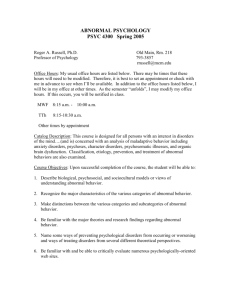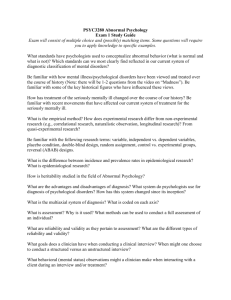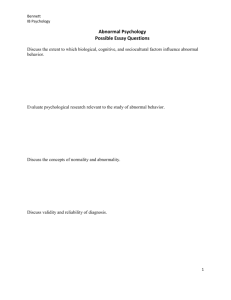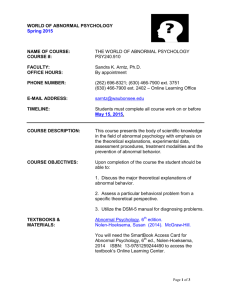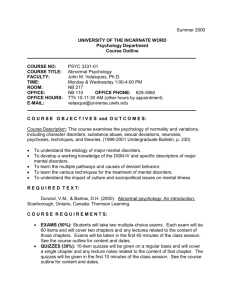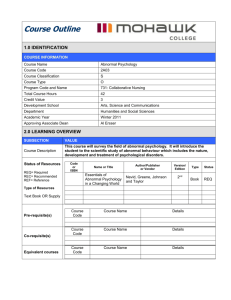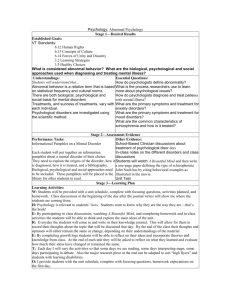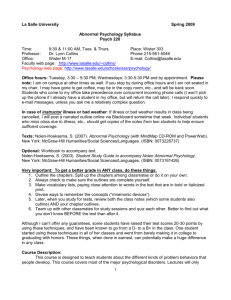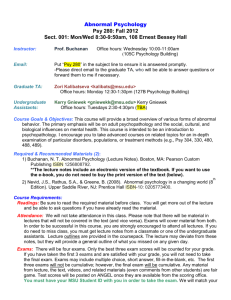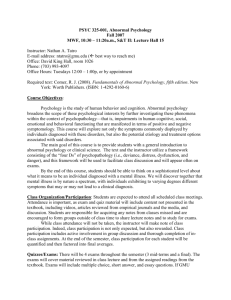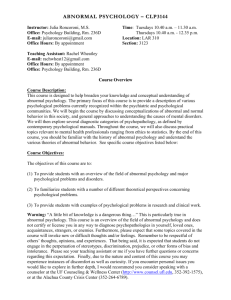ABnormal psychology
advertisement
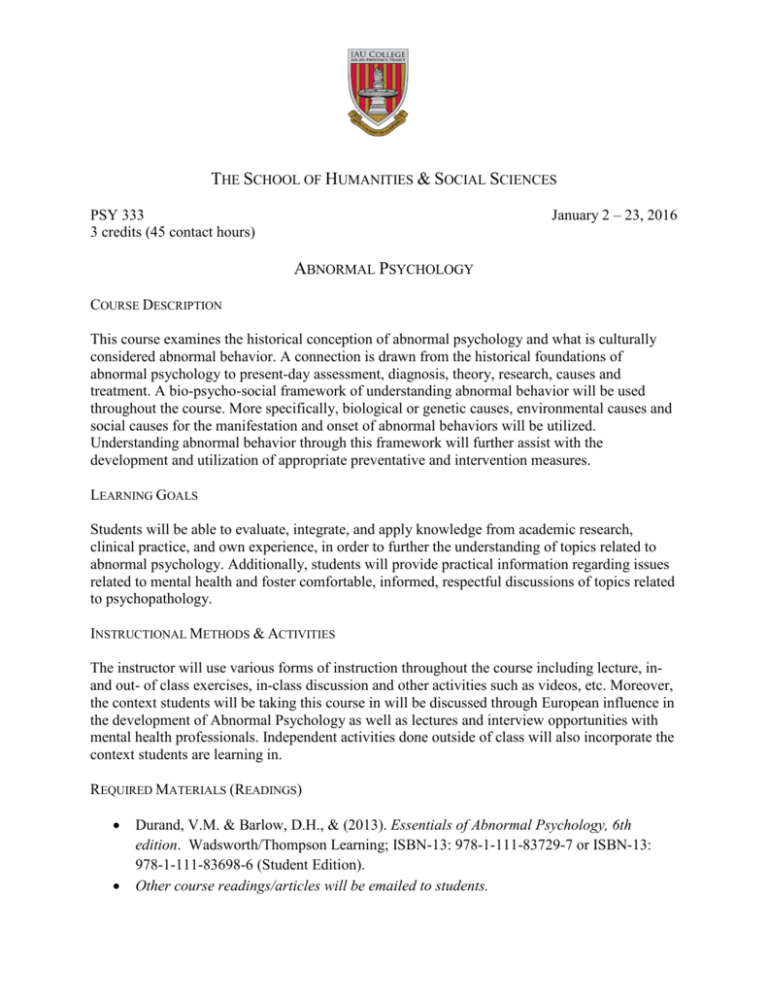
THE SCHOOL OF HUMANITIES & SOCIAL SCIENCES PSY 333 3 credits (45 contact hours) January 2 – 23, 2016 ABNORMAL PSYCHOLOGY COURSE DESCRIPTION This course examines the historical conception of abnormal psychology and what is culturally considered abnormal behavior. A connection is drawn from the historical foundations of abnormal psychology to present-day assessment, diagnosis, theory, research, causes and treatment. A bio-psycho-social framework of understanding abnormal behavior will be used throughout the course. More specifically, biological or genetic causes, environmental causes and social causes for the manifestation and onset of abnormal behaviors will be utilized. Understanding abnormal behavior through this framework will further assist with the development and utilization of appropriate preventative and intervention measures. LEARNING GOALS Students will be able to evaluate, integrate, and apply knowledge from academic research, clinical practice, and own experience, in order to further the understanding of topics related to abnormal psychology. Additionally, students will provide practical information regarding issues related to mental health and foster comfortable, informed, respectful discussions of topics related to psychopathology. INSTRUCTIONAL METHODS & ACTIVITIES The instructor will use various forms of instruction throughout the course including lecture, inand out- of class exercises, in-class discussion and other activities such as videos, etc. Moreover, the context students will be taking this course in will be discussed through European influence in the development of Abnormal Psychology as well as lectures and interview opportunities with mental health professionals. Independent activities done outside of class will also incorporate the context students are learning in. REQUIRED MATERIALS (READINGS) • • Durand, V.M. & Barlow, D.H., & (2013). Essentials of Abnormal Psychology, 6th edition. Wadsworth/Thompson Learning; ISBN-13: 978-1-111-83729-7 or ISBN-13: 978-1-111-83698-6 (Student Edition). Other course readings/articles will be emailed to students. CLASS POLICIES • Attendance and Participation: One of the primary requirements this semester is that you attend class. This is not a lecture class, and its success depends very much on your coming to class on time, prepared for the lesson, and ready to participate in discussion and activities, including pre-scheduled field studies during class hours. Attendance will be part of your final grade. It is your responsibility to make sure you have the assignment(s) in the event of your absence. All unexcused absences affect negatively your grade. Each additional unexcused absence above two will affect the final grade by a half letter grade for each absence. IAU College excused absences: absences linked to IAU excursions; sickness (a medical certificate is required); emergencies. • Make-up Classes: In case of a professor’s absence for personal or professional reasons, it may be necessary to make up lost class time in the evening or on Friday afternoon. “Make-up” classes will be announced at least one week in advance; for questions of attendance, exams, due work, etc., they are considered normal course meetings. • Plagiarism: Cheating in any form will not be tolerated. If you are caught cheating on an exam or writing assignment, you will be given a zero. You will be referred to the Dean of Students who will determine whether you will be allowed to continue studying at IAU for the duration of the semester. • Group Etiquette: For all group activities and assignments in this class, all group members are expected to participate and contribute. If it is found that you have not participated or contributed to a group assignment, you may receive a reduced grade. Group work is not voluntary or optional. Learning to work in groups is an important professional skill to develop. The instructor will determine the makeup of groups and team member rearrangement is not negotiable. • Laptop use and Cellphones: Laptops will not be used in class for any purpose, unless an accommodation is requested. Cellphones are not permitted for use in class. If you are on your cellphone during class, you will be counted as absent. If you are on your laptop and/or using a cellphone during class time and not instructed to do so it may hinder yours or another student’s learning. • Late work policy: Late submissions of any assignment will be counted as a zero grade. • Students with Disabilities: It is IAU’s goal to provide reasonable accommodations for students with a documented disability. If you have a disability and may need accommodations to fully participate in this class, please contact Dr. Leigh Smith, Dean of Students, Leigh.Smith@iaufrance.org CAMPUS/COMMUNITY RESOURCES A list of campus and community resources is available in IAU’s student orientation packet. If you would like an additional copy, please email the program coordinator. 2 GRADING SUMMARY Four exams, each covering about 1/4 of the course (i.e., the exams are non-cumulative). Exams will contain 50 multiple choice and occasional true/false items. Please do not ask what material will be covered in the exams - consider all of the material as potential exam material (i.e., lectures, readings, films). Participation: Students will form small groups of 3-7 participants for discussions 10 times during the semester. Procedures will be discussed in class. • • • 4 exams X 50 points each = 200 points possible Participation - 10 discussion groups X 10 = 100 points possible 300 total points possible FINAL GRADE BASED ON 250 POINTS A 280-300 A- 270-280 B+ B B- 260-269 250-259 240-249 Grade A AB+ B BC+ Percent 94 - 100% 90 - 93% 86 - 89% 83 - 85% 79 - 82% 75 - 78% C+ C C- 230-239 220-229 210-219 Grade C CD+ D F D+ D DF 200-209 190-199 180-189 < 180 Percent 71 - 74% 69 - 70% 67 - 68% 65 - 66% < 65% EXTRA CREDIT Students will be provided extra credit opportunities throughout the session at the discretion of the course instructors. Some examples of extra credit opportunities include attending community events and guest lectures and providing a reflection on such opportunities. Parameters and rubrics will be discussed when extra credit is offered. 3 COURSE SCHEDULE This is a tentative schedule and adjustments may be made at the discretion of the instructors at any point during the session. Week 1 1 1 1 1 1 1 1 1 1 2 2 2 2 2 2 2 2 2 2 3 3 3 3 3 3 3 3 Topic Course Overview and Introduction Abnormal Behavior in Historical Context Discussion Group 1 An Integrative Approach to Psychopathology Discussion Group 2 Clinical Assessment, Diagnosis and Research Methods Chapter 3 Exam #1: Chapters 1-3 Anxiety Disorders Discussion Group 3 Somatoform and Dissociative Disorders Discussion Group 4 Mood Disorders and Suicide Discussion Group 5 Physical Disorders and Health Psychology Exam #2: Chapters 4-7 Eating and Sleep Disorders Sexual and Gender Identity Disorders Discussion Group 6 Substance-Related Disorders Discussion Group 7 Personality Disorders Discussion Group 8 Exam #3: Chapters 8-11 Schizophrenia and Other Psychotic Disorders Discussion Group 9 Developmental and Cognitive Disorders Discussion Group 10 Mental Health Services: Legal and Ethical Issues Final Exam Chapter 1 2 3 4 5 6 7 8 9 10 11 12 13 14 4
